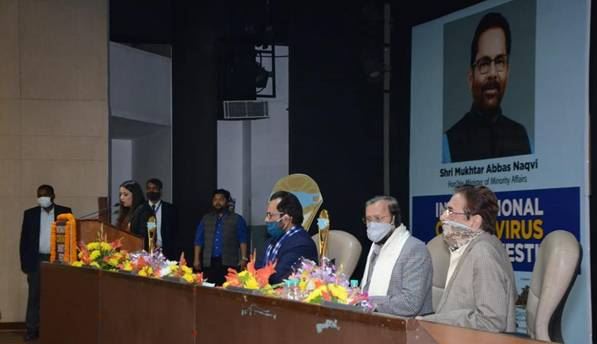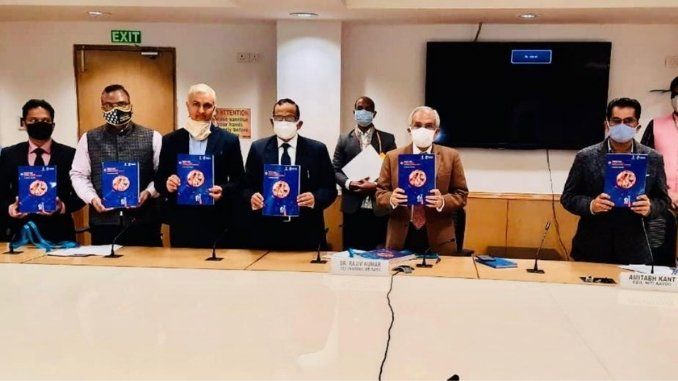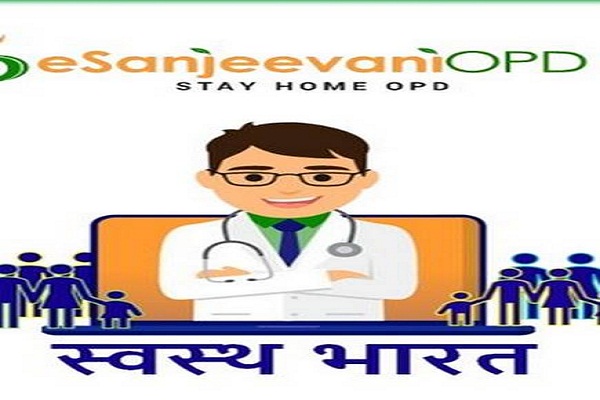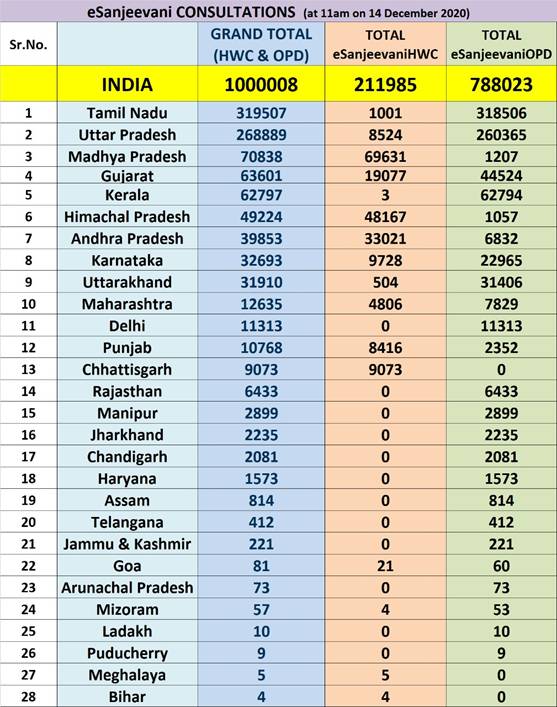“eSanjeevani” telemedicine service records 1 million tele-consultations
New Delhi, Dec 14: India has crossed a landmark milestone in its eHealth journey. eSanjeevani telemedicine service of the Health Ministry has crossed 1 million (10 lakh) tele-consultations today.Telemedicine entails delivery of health services from a distance using internet and it not only extends the reach of health services but also improves quality of health services besides saving time and money.
The roll out of eSanjeevani in India is supposedly the first of its kind of digital transformation in the delivery of health services at national scale by a developing country. During the COVID-19 pandemic, eSanjeevani not only brought about a huge digital transformation in the delivery of health services but had also boosted the digital health ecosystem in the country.
eSanjeevani initiative of Health Ministry is serving in two streams in 28 States and Union Territories. The eSanjeevaniAB-HWC enables doctor to doctor teleconsultations and is being used at around 6000 Health & Wellness Centres which are being served by specialists and doctors in around 240 hubs which have been set up by States in District Hospitals or Medical Colleges etc. Over 20,000 paramedics, doctors and specialists have been trained to use eSanjeevaniAB-HWC.
The second stream eSanjeevaniOPD is or providing remote health services to patients in the confines of their homes. eSanjeevaniOPD enables contactless, risk-free, and safe consultations between a doctor and a patient. It received a huge reception by both the patients and the doctors.Around 8000 doctors have been trained and onboarded on eSanjeevaniOPD and on an average around 1500 doctors practice telemedicine daily in around 225 onlineOPDs of which 190 are speciality OPDs and around 30 are general OPDs. Of late, daily eSanjeevani has been serving around 14,000 patients across the country.
eSanjeevani is being used by patients in over 550 districts of India. Over 10% of the users of eSanjeevani are aged 60 and above. Close to around one fourth of the total patients have used eSanjeevani more than once.These stands as a testimony to the fact that public has started preferring telemedicine over visiting hospital OPDs for consulting a doctor.
Considering the inherent potential and social impact of this emergent digital modality of delivery of health services, the States have designed innovative applications around eSanjeevaniOPD. In Kerala, eSanjeevaniOPD is is being used for providing health services to the inmates of Palakkad District Jail, in Himachal Pradesh too it is being rolled out in old age homes. Quick adoption of eSanjeevaniOPD services across the country has enabled launch of wide range of speciality and super-speciality OPDs including alternative medical systems such as AYUSH and naturopathy. Kerala has already setting up OPDs on eSanjeevaniOPD for providing services of Rashtriya Bal Swasthya Karyakram – District Early Intervention Centres for its populace. Each of these 14 onlineOPDs has a team comprising of psychologist, special educator, speech therapist and a physiotherapist who collectively address common issues pertaining to child development and their future health.
The State Governments are complimenting the efforts of the Union Ministry of Health and Family Welfare, by establishing a robust digital health ecosystem comprising of IT savvy human and infrastructural resources to boost the adoption of eSanjeevani. The Health Informatics group of Centre for Development of Advanced Computing in Mohali is providing end-to-end technical services including development, implementation, operations, of eSanjeevaniOPD besides training clinicians. The Health Ministry in consultation with the States and C-DAC Mohali is consistently working towards enriching features and functionalities in eSanjeevani to empower patients and doctors even more.
The top ten States with highest consultations through eSanjeevani and eSanjeevaniOPD platforms are Tamil Nadu (319507), Uttar Pradesh (268889), Madhya Pradesh (70838), Gujarat (63601), Kerala (62797), Himachal Pradesh (49224), Andhra Pradesh (39853), Karnataka (32693), Uttarakhand (31910) and Maharashtra (12635).
PM interacts with Space sector industries, startups and academia

Prime Minister Narendra Modi interacting with key industries, startups and academia from the Space sector via video conferencing on Monday. -Solution World.
New Delhi, Dec 14: Prime Minister Narendra Modi today interacted with key industries, startups and academia from the Space sector via video conferencing to encourage their participation in space activities.
The Union Cabinet led by the Prime Minister took the historic decision in June 2020 to open up the Space sector and enable the participation of Indian private sector in the entire gamut of space activities. With the creation of Indian National Space Promotion and Authorization Centre (IN-SPACe), the reforms will provide a level playing field for private companies and start-ups. Subsequently, several ventures have submitted proposals with IN-SPACe under the Department of Space. The proposals pertain to a vast range of activities including satellite constellation, small satellite launch vehicles, ground station, geospatial services, propulsion systems and application products.
The PM thanked the participants for providing feedback about their experience so far. He said that the decision to unlock India’s potential in the Space sector has heralded a new age of public-private partnership in this sector. He assured the participants of complete and wholehearted support of the government in this endeavour. He noted that the professionalism and transparency in policies as well as the decision-making process of the government will prove beneficial for the companies joining the Space sector.
Taking note of the plans of companies to make rockets and satellites, the Prime Minister remarked that this marks a big change that will further strengthen India’s foray into the Space sector. He said that private investment in the sector will lead to the creation of hi-tech jobs, which will provide a host of opportunities to the talent pool in IITs/NITs and other technical institutions. He said that it is his firm belief that just like Indian talent has been able to attain worldwide fame in the IT sector, it will be able to do so in the Space sector as well.
Modi underlined that the reforms in the Space sector are not limited to ensuring ease of doing business, but necessary mechanisms have also been put in place to ensure help for the participants at each stage, including making available testing facilities and launchpads. He said that through these reforms, the endeavour is not only to ensure that India becomes a competitive space market, but also to ensure the benefits of the space programme reach out to the poorest. He asked the participants to think boldly and work for the benefit of the society and the country.
Prime Minister underlined the significance of the Space sector in communication and navigation. He assured the participants that they will be co-passengers with ISRO in this age of space research and expressed hope that the country would soon become the manufacturing hub of space assets.
Dr K. Sivan, Secretary, Department of Space (DOS) and Chairman, ISRO, briefed the Prime Minister on various proposals received from industry for obtaining permission from IN-SPACe and support from the Department of Space. He informed that more than 25 industries have already approached DOS for undertaking their space activities.
During the interaction, the participants provided feedback on the reforms to the Prime Minister. Sunil Bharti Mittal from Bharti Enterprises, Jayant Patil from Larsen & Toubro Ltd, Srinath Ravichandran from Agnikul Cosmos Pvt Ltd, Pawan Kumar Chandana from Skyroot Aerospace Ltd, Col H S Shankar from Alpha Design Technologies Pvt. Ltd., Rakesh Verma from MapmyIndia, Awais Ahmed from PIXXEL India and Srimathy Kesan from Space Kidz India expressed their views during the session. They thanked the Prime Minister for the move of opening up the sector for private participation, adding that this will help India move towards becoming a superpower in space technology. They expressed resolve to work as active participants in the AatmaNirbhar Bharat Abhiyan.
Short films played crucial role to make people aware about Corona pandemic: Naqvi

New Delhi, Dec 14: Union Minister of Minority Affairs Mukhtar Abbas Naqvi has said that the government, society, cinema and media in India have played a commendable role with courage, commitment and caution during the Corona pandemic. Short films conveying awareness and strong message played an important role during the crisis.
While addressing the “International Corona Virus Short Film Festival” at NDMC Convention Centre in New Delhi today, Naqvi said that short films played a crucial role in making the people aware of challenges of the Corona pandemic.
Union Information and Broadcasting Minister Prakash Javadekar, renowned film personalities, diplomats from various countries, journalists, intellectuals and other dignitaries were present on the occasion. More than 2800 films from 108 countries are participating in “International Corona Virus Short Film Festival”. These short films are based on cure, safety measure and lives during the Corona pandemic.
He said that due to the Corona pandemic, shooting of films had largely been postponed for a long time. During this crisis, short films not only entertained the people but also made the people aware of Corona challenge. Different channels, be it news channel, entertainment channel, sports or business channel, all played a praiseworthy role regarding spreading awareness among the people regarding the Corona pandemic.
Naqvi said that the history is a witness to the fact that whenever there is a crisis in the country, the government, society, cinema and mediaall have together performed their respective responsibilities with complete honesty in national interest and human welfare.
The Union Minister said that the entire world is facing such a crisis in the form of the Corona pandemic after centuries. Many generations have not seen such a challenge. Still, we have left no stone unturned to play the role of a mature society, government, cinema and media and especially in India, all these four sections became a part of solution to the problem.
Naqvi said that there have been positive revolutionary changes in work culture, character and commitment of the administration, society, cinema and media during the last about 10 months. Reforms don’t take place due to only regulation, they take place due to resolution. Today, in the Corona pandemic, every section has been witnessing drastic change in the work culture and lifestyle.
He said that the Indian society is crazy for good entertaining films, full of effective message to the society, that too on big screen. Films and media have not only become an indispensable part of our life, they also have strength to influence the society. This has been proved by short films during the Corona crisis.
Speaking at the International Coronavirus Short Film Festival, Union Minister of Information and Broadcasting Prakash Javadekar said that the idea of organizing a film festival to celebrate short films made on coronavirus was wonderful. Javadekar said that the festival witnessing participation of 2,800 films from 108 countries on a single topic is an example of peoples’ immense talent. He congratulated the organizers of the festival.
NITI Aayog releases ‘Vision 2035: Public Health Surveillance in India’

-Solution World
New Delhi, Dec 14: NITI Aayog today released a white paper: Vision 2035: Public Health Surveillance in India with the vision:
-To make India’s public health surveillance system more responsive and predictive to enhance preparedness for action at all levels.
-Citizen-friendly public health surveillance system will ensure individual privacy and confidentiality, enabled with a client feedback mechanism.
-Improved data-sharing mechanism between Centre and states for better disease detection, prevention, and control.
-India aims to provide regional and global leadership in managing events that constitute a public health emergency of international concern.
The white paper was released by NITI Aayog Vice Chairman Dr Rajiv Kumar; Member (Health) DrVinod K Paul; CEO Amitabh Kant; and Additional Secretary Dr Rakesh Sarwal.
‘Vision 2035: Public Health Surveillance in India’is a continuation of the work on health systems strengthening. It contributes by suggesting mainstreaming of surveillance by making individual electronic health records the basis for surveillance. Public health surveillance (PHS) is an important function that cuts across primary, secondary, and tertiary levels of care. Surveillance is ‘Information for Action’.
The Covid-19 pandemic has provided us with an opportunity to revisit (re) emerging diseases due to increased interaction between human-animal-environment. Early identification of this interference is essential to break the chain of transmissions and create a resilient surveillance system. This vision document is a step in that direction, it articulates the vision and highlights the building blocks. It envisions a citizen-friendly public health system, which will involve stakeholders at all levels, be it individual, community, health care facilities or laboratories, all while protecting the individual’s privacy and confidentiality.’
The white paper lays out India’s vision 2035 for public health surveillance through the integration of the three-tiered public health system into Ayushman Bharat. It also spells out the need for expanded referral networks and enhanced laboratory capacity. The building blocks for this vision are an interdependent federated system of governance between the Centre and states, a new data-sharing mechanism that involves the use of new analytics, health informatics, and data science including innovative ways of disseminating ‘information for action’.
The paper released today is envisagedto serve as a vision document to propel public health surveillance in Indiaand establish India as a global leader in the area.

